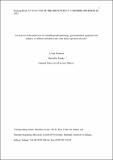| dc.contributor.author | Mannion, Arlene | |
| dc.contributor.author | Leader, Geraldine | |
| dc.date.accessioned | 2018-06-20T14:30:01Z | |
| dc.date.available | 2018-06-20T14:30:01Z | |
| dc.date.issued | 2013-10-31 | |
| dc.identifier.citation | Mannion, Arlene, & Leader, Geraldine. (2013). An analysis of the predictors of comorbid psychopathology, gastrointestinal symptoms and epilepsy in children and adolescents with autism spectrum disorder. Research in Autism Spectrum Disorders, 7(12), 1663-1671. doi: https://doi.org/10.1016/j.rasd.2013.10.002 | en_IE |
| dc.identifier.issn | 1750-9467 | |
| dc.identifier.uri | http://hdl.handle.net/10379/7409 | |
| dc.description.abstract | Mannion, Leader, and Healy (2013) examined the frequency of comorbid disorders in children and adolescents with autism spectrum disorder and the predictors of sleep problems. This study will extend this research by investigating the predictors of comorbidity in 89 participants. Age, gender, level of intellectual disability, presence of epilepsy, attention deficit/hyperactivity disorder (AD/HD) and an anxiety disorder were determined using a self-constructed demographic questionnaire. The Autism Spectrum Disorder-Comorbid for Children (ASD-CC) was administered to informants to assess symptoms of comorbid psychopathology. The Children's Sleep Habits Questionnaire (CSHQ) and Gastrointestinal symptom inventory were administered to assess sleep problems and gastrointestinal symptoms respectively. Sleep problems predicted gastrointestinal symptoms. Level of intellectual disability predicted gastrointestinal symptoms. Specifically, those with no intellectual disability were more likely to present with gastrointestinal symptoms. Gastrointestinal symptoms in turn predicted total comorbid psychopathology score and the individual subscales of worry/depressed, avoidant behavior, conduct behavior and tantrum behavior on the ASD-CC. Gender and ASD-CC total score predicted an individual having an anxiety disorder. Specifically, being male predicted an anxiety disorder. The ASD-CC subscales of worry/depressed and avoidant behavior predicted an anxiety disorder. The implications of these findings are discussed in the study. | en_IE |
| dc.format | application/pdf | en_IE |
| dc.language.iso | en | en_IE |
| dc.publisher | Elsevier | en_IE |
| dc.relation.ispartof | Research In Autism Spectrum Disorders | en |
| dc.rights | Attribution-NonCommercial-NoDerivs 3.0 Ireland | |
| dc.rights.uri | https://creativecommons.org/licenses/by-nc-nd/3.0/ie/ | |
| dc.subject | Comorbidity | en_IE |
| dc.subject | Autism spectrum disorder | en_IE |
| dc.subject | Comorbid psychopathology | en_IE |
| dc.subject | Sleep problems | en_IE |
| dc.subject | Gastrointestinal symptoms | en_IE |
| dc.title | An analysis of the predictors of comorbid psychopathology, gastrointestinal symptoms and epilepsy in children and adolescents with autism spectrum disorder | en_IE |
| dc.type | Article | en_IE |
| dc.date.updated | 2018-06-18T20:02:49Z | |
| dc.identifier.doi | 10.1016/j.rasd.2013.10.002 | |
| dc.local.publishedsource | https://doi.org/10.1016/j.rasd.2013.10.002 | en_IE |
| dc.description.peer-reviewed | peer-reviewed | |
| dc.internal.rssid | 14500998 | |
| dc.local.contact | Arlene Mannion, Irish Centre For Autism, & Neurodevelopment Research, School Of Psychology, Nui Galway. Email: arlene.mannion@nuigalway.ie | |
| dc.local.copyrightchecked | Yes | |
| dc.local.version | ACCEPTED | |
| nui.item.downloads | 426 | |


